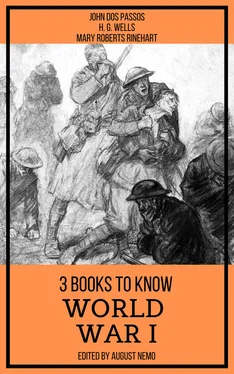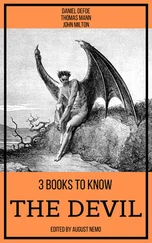“You'll see.”
They sat down before a dish of fried eggs at the table in the corner, the favoured table, where Marie herself often sat and chatted, when wizened Madame did not have her eye upon her.
Several men drew up their chairs. Wild Dan Cohan always had an audience.
“Looks like there was going to be another offensive at Verdun,” said Dan Cohan. Someone answered vaguely.
“Funny how little we know about what's going on out there,” said one man. “I knew more about the war when I was home in Minneapolis than I do here.”
“I guess we're lightin' into 'em all right,” said Fuselli in a patriotic voice.
“Hell! Nothin' doin' this time o' year anyway,” said Cohan. A grin spread across his red face. “Last time I was at the front the Boche had just made a coup de main and captured a whole trenchful.”
“Of who?”
“Of Americans—of us!”
“The hell you say!”
“That's a goddam lie,” shouted a black-haired man with an ill-shaven jaw, who had just come in. “There ain't never been an American captured, an' there never will be, by God!”
“How long were you at the front, buddy,” asked Cohan coolly. “I guess you been to Berlin already, ain't yer?”
“I say that any man who says an American'ld let himself be captured by a stinkin' Hun, is a goddam liar,” said the man with the ill-shaven jaw, sitting down sullenly.
“Well, you'd better not say it to me,” said Cohan laughing, looking meditatively at one of his big red fists.
There had been a look of apprehension on Marie's face. She looked at Cohan's fist and shrugged her shoulders and laughed.
Another crowd had just slouched into the cafe.
“Well if that isn't wild Dan! Hello, old kid, how are you?”
“Hello, Dook!”
A small man in a coat that looked almost like an officer's coat, it was so well cut, was shaking hands effusively with Cohan. He wore a corporal's stripes and a British aviator's fatigue cap. Cohan made room for him on the bench.
“What are you doing in this hole, Dook?” The man twisted his mouth so that his neat black mustache was a slant.
“G. O. 42,” he said.
“Battle of Paris?” said Cohan in a sympathetic voice. “Battle of Nice! I'm going back to my section soon. I'd never have got a court-martial if I'd been with my outfit. I was in the Base Hospital 15 with pneumonia.”
“Tough luck!”
“It was a hell of a note.”
“Say, Dook, your outfit was working with ours at Chamfort that time, wasn't it?”
“You mean when we evacuated the nut hospital?”
“Yes, wasn't that hell?” Dan Cohan gulped down half a glass of red wine, smacked his thick lips, and began in his story-telling voice:
“Our section had just come out of Verdun where we'd been getting hell for three weeks on the Bras road. There was one little hill where we'd have to get out and shove every damn time, the mud was so deep, and God, it stank there with the shells turning up the ground all full of mackabbies as the poilus call them.... Say, Dook, have you got any money?”
“I've got some,” said Dook, without enthusiasm.
“Well, the champagne's damn good here. I'm part of the outfit in this gin mill; they'll give it to you at a reduction.”
“All right!”
Dan Cohan turned round and whispered something to Marie. She laughed and dived down behind the curtain.
“But that Chamfort was worse yet. Everybody was sort o' nervous because the Germans had dropped a message sayin' they'd give 'em three days to clear the hospital out, and that then they'd shell hell out of the place.”
“The Germans done that! Quit yer kiddin',” said Fuselli.
“They did it at Souilly, too,” said Dook. “Hell, yes.... A funny thing happened there. The hospital was in a big rambling house, looked like an Atlantic City hotel.... We used to run our car in back and sleep in it. It was where we took the shell-shock cases, fellows who were roarin' mad, and tremblin' all over, and some of 'em paralysed like.... There was a man in the wing opposite where we slept who kept laugh-in'. Bill Rees was on the car with me, and we laid in our blankets in the bottom of the car and every now and then one of us'ld turn over and whisper: 'Ain't this hell, kid?' 'cause that feller kept laughin' like a man who had just heard a joke that was so funny he couldn't stop laughin'. It wasn't like a crazy man's laugh usually is. When I first heard it I thought it was a man really laughin', and I guess I laughed too. But it didn't stop.... Bill Rees an' me laid in our car shiverin', listenin' to the barrage in the distance with now and then the big noise of an aeroplane bomb, an' that feller laughin', laughin', like he'd just heard a joke, like something had struck him funny.” Cohan took a gulp of champagne and jerked his head to one side. “An that damn laughin' kept up until about noon the next day when the orderlies strangled the feller.... Got their goat, I guess.”
Fuselli was looking towards the other side of the room, where a faint murmur of righteous indignation was rising from the dark man with the unshaven jaw and his companions. Fuselli was thinking that it wasn't good to be seen round too much with a fellow like Cohan, who talked about the Germans notifying hospitals before they bombarded them and who was waiting for a court-martial. Might get him in wrong. He slipped out of the cafe into the dark. A dank wind blew down the irregular street, ruffling the reflected light in the puddles, making a shutter bang interminably somewhere. Fuselli went to the main square again, casting an envious glance in the window of the Cheval Blanc, where he saw officers playing billiards in a well-lighted room painted white and gold, and a blond girl in a raspberry-colored shirtwaist enthroned haughtily behind the bar. He remembered the M. P. and automatically hastened his steps. In a narrow street the other side of the square he stopped before the window of a small grocery shop and peered inside, keeping carefully out of the oblong of light that showed faintly the grass-grown cobbles and the green and grey walls opposite. A girl sat knitting beside the small counter with her two little black feet placed demurely side by side on the edge of a box full of red beets. She was very small and slender. The lamplight gleamed on her black hair, done close to her head. Her face was in the shadow. Several soldiers lounged awkwardly against the counter and the jambs of the door, following her movements with their eyes as dogs watch a plate of meat being moved about in a kitchen.
After a little the girl rolled up her knitting and jumped to her feet, showing her face,—an oval white face with large dark lashes and an impertinent mouth. She stood looking at the soldiers who stood about her in a circle, then twisted up her mouth in a grimace and disappeared into the inner room.
Fuselli walked to the end of the street where there was a bridge over a small stream. He leaned on the cold stone rail and looked into the water that was barely visible gurgling beneath between rims of ice.
“O this is a hell of a life,” he muttered.
He shivered in the cold wind but remained leaning over the water. In the distance trains rumbled interminably, giving him a sense of vast desolate distances. The village clock struck eight. The bell had a soft note like the bass string of a guitar. In the darkness Fuselli could almost see the girl's face grimacing with its broad impertinent lips. He thought of the sombre barracks and men sitting about on the end of their cots. Hell, he couldn't go back yet. His whole body was taut with desire for warmth and softness and quiet. He slouched back along the narrow street cursing in a dismal monotone. Before the grocery store he stopped. The men had gone. He went in jauntily pushing his cap a little to one side so that some of his thick curly hair came out over his forehead. The little bell in the door clanged.
Читать дальше












